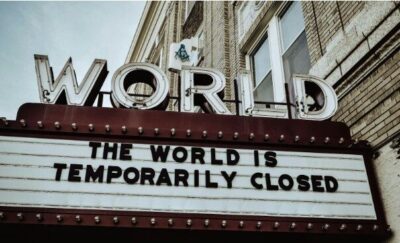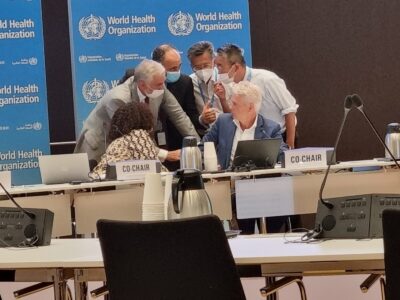Main content
The Covid-19 pandemic has created havoc around the world since the early days of 2020. My attendance at a civil society meeting in Geneva coincided with the World Health Organization (WHO) declaring the Covid-19 epidemic a public health emergency of international concern (PHEIC).[1,2] Mike Ryan, director of WHO Health Emergencies Programme was worried, yet still optimistic, estimating that the epidemic could be contained at the regional level in Asia. I shared the same sentiment and travelled on after the meeting to Indonesia without real concerns. I returned to the Netherlands just before the epidemic escalated and international borders were closed.
June 2020, we are six months into the pandemic and over 9 million confirmed cases of Covid-19 have now been reported to the WHO, including more than 470,000 deaths.[3] Questions have been raised about the role and capacity of the WHO and other international actors in assisting countries to prepare for and respond to a viral pandemic of this magnitude. According to Dr Tedros, WHO’s director general, the main reason for declaring this PHEIC was ‘not because of what is happening in China, but because of what is happening in other countries. Our greatest concern is the potential for the virus to spread to countries with weaker health systems, and which are ill-prepared to deal with it’.[1]
The WHO was prepared, in the sense that it was well aware of the emergence of another “Disease-X” – a yet unknown pathogen causing a human disease which eventually would lead to a serious epidemic.[4] The world had witnessed such epidemics before, like the SARS epidemic in 2003, which remained largely contained to China, the Ebola-epidemic which impacted mainly countries in West Africa (2014-2015), as well as other emerging zoonoses such as avian flu, Zika, and Lassa fever. These epidemics all raised global concern (some more than others), and inspired global health actors and national government leaders to underscore the need to strengthen global health security. Sadly, few countries really acted upon their initial commitments and failed to invest in an essential public health function that others have labelled a global public good.[5]
International health regulations
Following the 2003 SARS epidemic, the World Health Assembly (WHA) adopted a revised version of the international health regulations (IHR), which since their adoption in 1969 had served as the main framework governing the international response and a country’s capacity to deal with public health emergencies, including major infectious disease outbreaks.[6,7] Under the IHR, and upon declaration of a PHEIC, the WHO has the power to provide countries with temporary, non-mandatory recommendations on how to deal with the emergency at hand. Countries are not legally obliged to adopt such recommendations, such as in this case testing for Covid-19 virus, tracking possible cases, and identifying risk-groups. However, the IHR obliges countries not to implement policies that would prevent international trade and mobility. For example, WHO member states cannot suddenly make medical examinations, vaccinations or prophylaxis compulsory for travellers in case they are potentially infectious. This did not prevent Austria and other European states from requesting foreign travellers to their countries to provide a certificate of a negative Covid-19 test result. These actions clearly constituted a breach of the IHR,[8] but they could not be followed by any sanctions. Other multilateral organisations perform better in this sense. The World Trade Organization (WTO), for example, uses international dispute settlement mechanisms and a sanction regime when international trade rules are violated. It has become clear that WHO’s IHR provides only limited resources, mandate, and legitimacy to direct sovereign countries in addressing their approaches to disease outbreaks and other public health risks. Interestingly though, a hundred years before WHO’s establishment, countries already tried to regulate international public health responses.[9] In the words of leading global health lawyers: ‘The IHR is no “magic bullet” for global health problems. Previous transformations in international law’s relationship with public health have over time atrophied into insignificance.'[7]
Political tensions between the United States of America and China
The recent critique by the Trump administration that WHO has an ‘alarming lack of independence from the People’s Republic of China’ in addressing the Covid-19 pandemic is unfounded.[10] Donald Trump’s decision to sever ties with the WHO and his threat to halt funding must be seen as part of a larger geopolitical conflict between the USA and China. A kind of Cold War 2.0 meant to divert attention from the disastrous response and poor performance of the USA’s health system itself.[11] China has made errors in dealing with Covid-19, especially in terms of transparency at the beginning of the epidemic. Human rights violations have been an issue in the stringent lockdown and surveillance by the Chinese state.[12] Nevertheless, the rapid public health response by China, and Southeast Asia more generally, has so far proven effective in containing the virus. This has been noted by other low- and middle-income countries (LMICs) and by the WHO. In the report by a WHO evaluation mission to China in February, Dr Tedros hailed the country’s swift response and approach.[13] For diplomatic and global health objectives, it is important that the WHO keeps working closely with the world’s most populous country (1.4 billion inhabitants). At the same time, there are informal complaints regarding controlled and restricted access to China for the WHO officials. Meanwhile, China has committed to stepping up multilateral collaboration, pledging US$ 2 billion to the United Nations (UN) for its Covid-19 response, and it has agreed to a full evaluation of the international response once the pandemic is over.[14] In any case, this is a watershed moment in global health, not only for the WHO. In the coming years we are likely to see the USA retreating from international health cooperation in LMICs while China may considerably step up its bilateral health collaboration with African, Asian and Latin American countries.[15]
The erosion of the WHO
Ironically, the USA, along with some affluent European countries are responsible for WHO’s limited capacity to deal with transnational health emergencies. The roots of this problem lie in the governance structure, in which the WHA, composed of all 190+ member states, decides collectively on WHO’s programme of work. In the 1980s, high-income countries, in response to the growing influence of LMICs, decided to review their financial contributions to the UN and the WHO in particular, changing to voluntary payments. In the current set-up, eighty percent of WHO’s budget is comprised of voluntary contributions by member states, philanthropic organisations (such as the Bill & Melinda Gates Foundation), and private donors. This has led to a situation in which donors no longer provide core funding, but rather support particular programmes, i.e. those that fit their own (domestic) interests. Examples include the USA’s financial support for polio eradication, and the Netherlands’ targeting of funds to sexual and reproductive health and rights programmes of the WHO. The result has been severe underfunding of certain other programmes, such as emergency preparedness, health systems strengthening (including health workforce strengthening) in LMICs and programmes aimed at achieving universal health coverage. Meanwhile, we have witnessed a surge of global health initiatives for disease-specific approaches, such as the Global Fund to Fight AIDS, Tuberculosis and Malaria (GFATM), Gavi, the Vaccine Alliance, the Global Health Security Agenda (GHSA), and others. They generally deliver short term results, over which the donor countries have more direct control. In the process, the WHO has become hamstrung by its donors, limited in its autonomy, and become relatively neglected in a neoliberal era in which policy objectives such as “value for money” and “enlightened self-interest” received priority over the provision of global public goods, such as the international capacity to respond to pandemics. This trend is also described as “Trojan multilateralism” and has seriously eroded the UN over the last decade.[16]
Solidarity and shared responsibilities
The World Health Report 2007 on health security stated that ’57 countries, most of them in Sub-Saharan Africa and Southeast Asia, are struggling to provide even basic health security to their populations’.[17] In response to the 2014-2015 Ebola epidemic, there has been much talk about the need to develop strong and resilient health systems. No less than four international commissions have provided recommendations on how to improve the international response to health emergencies.[18] All of these commissions recommended strengthening WHO’s mandate, autonomy and financial basis, as well as reforming the IHR with a view to strengthen its capacity to address global public health risks. The Covid-19 pandemic may provide the “shock momentum” that was needed to stabilize and improve – in a democratic way – the only internationally mandated health organisation in the world.
In his media briefing in late June 2020, Dr Tedros made a plea for global solidarity and urged countries to work together to ensure that supplies (e.g. dexamethasone, oxygen, personal protective equipment) and vaccine development are prioritized for countries with large numbers of critically ill Covid-19 patients. ‘The world is learning the hard way that health is not a luxury item; it’s the cornerstone of security, stability and prosperity.'[19]
Germany has announced it will make an unprecedented € 500 million pledge to the WHO. This must be seen as a plug for the large funding gap left by the withdrawal of the USA.[20] It can also be seen as a geopolitical signal to the world. Germany prefers in these uncertain times to invest in health security (WHO) rather than military security (NATO). So far, the Dutch government has committed US$ 6.5 million to the WHO for the Covid-19 response.[21] At the same time, it is providing its national airline, KLM, with a € 3.6 billion (!) guarantee to secure its position in international trade and mobility. Will the Netherlands eventually realize that this interconnectedness relies on the peace, wellbeing and health of societies in other parts of the world? Isn’t it time to put aside such a frugal attitude and instead invest seriously in global public health? That would be the real call, in the current era of pandemic threats, climate emergency, economic instability and growing disparities.
References
- World Health Organization [Internet]. Geneva: World Health Organization. WHO Director-General’s statement on IHR Emergency Committee on novel coronavirus (2019-nCoV); 2020 Jan 30. Available from: https://www.who.int/dg/speeches/detail/who-director-general-s-statement-on-ihr-emergency-committee-on-novel-coronavirus-(2019-ncov)
- G2H2 Geneva Global Health Hub [Internet]. Geneva: Geneva Global Health Hub. Civil society meetings ahead of the 146th Session of the WHO Executive Board, 31 January and 1 February 2020; 2019 Dec 30. Available from: http://g2h2.org/posts/january2020/
- World Health Organization [Internet]. Geneva: World Health Organization. WHO coronavirus disease (COVID-19) dashboard; updated 2020 Jul 15. Available from: https://covid19.who.int/
- World Health Organization [Internet]. Geneva: World Health Organization. Prioritizing diseases for research and development in emergency contexts; 2020. Available from: https://www.who.int/activities/prioritizing-diseases-for-research-and-development-in-emergency-contexts
- Smith RD, MacKellar L. Global public goods and the global health agenda: problems, priorities and potential. Global Health. 2007 Sep 22;3:9
- World Health Organization. International Health Regulations (2005): third edition [Internet]. Geneva: World Health Organization; 2016. 84 p. Available from: https://www.who.int/ihr/publications/9789241580496/en/
- Fidler DP, Gostin LO. The new International Health Regulations: an historic development for international law and public health. J Law Med Ethics. Spring 2006;34(1):85-94, 4.
- Schengen Visa Info [Internet]. Schengenvisainfo.com; 2012-2020. Number of EU countries asking travellers for COVID-19 negative test results is on the rise; 2020 Jun 1. Available from: https://www.schengenvisainfo.com/news/number-of-eu-countries-asking-travellers-for-covid-19-negative-test-results-is-on-the-rise/
- Fidler DP. The globalization of public health: the first 100 years of international health diplomacy. Bull World Health Organ. 2001;79:842-9
- Letter by The White House to Dr. Tedros Adhananom Ghebreyesus, Director-General of the World Health Organization on May 18, 2020. Available from: https://www.whitehouse.gov/wp-content/uploads/2020/05/Tedros-Letter.pdf
- Huang Y. Trump’s decision to pull U.S. out of WHO will boost China’s influence. Washington Post [Internet]. 2020 Jun 23. Available from: https://www.washingtonpost.com/politics/2020/06/23/trumps-decision-pull-us-out-who-will-boost-chinas-influence/
- Zhangrun X, Barmé GR. Viral alarm: when fury overcomes fear. ChinaFile [Internet]. 2020 Feb 10. Available from: https://www.chinafile.com/reporting-opinion/viewpoint/viral-alarm-when-fury-overcomes-fear
- World Health Organization. Report of the WHO: China joint mission on coronavirus disease 2019 (COVID-19): 16-24 February 2020. Geneva: World Health Organization; 2020. 40 р.
- Lau S. Xi Jinping defends China: WHO coronavirus response for first time on world stage. South China Morning Post [Internet]. 2020 May 18. Available from: https://www.scmp.com/news/china/diplomacy/article/3084916/coronavirus-xi-jinping-defends-china-and-who-response-world
- Husain L, Bloom G. Understanding China’s growing involvement in global health and managing processes of change. Global Health. 2020 May 1;16(1):39
- Van de Pas R, van Schaik LG. Democratizing the World Health Organization. Public Health. 2014 Feb;128(2):195-201
- World Health Organization. The world health report 2007: a safer future: global public health security in the 21st century. Geneva: World Health Organization; 2007. 96 p.
- Gostin LO, Tomori O, Wibulpolprasert S, et al. Toward a common secure future: four global commissions in the wake of Ebola. PLoS Med. 2016 May 19;13(5):21002042
- Van de Pas R, van Schaik LG. Democratizing the World Health Organization. Public Health. 2014 Feb;128(2):195-201
- World Health Organization. The world health report 2007: a safer future: global public health security in the 21st century. Geneva: World Health Organization; 2007. 96 p.
- Gostin LO, Tomori O, Wibulpolprasert S, et al. Toward a common secure future: four global commissions in the wake of Ebola. PLoS Med. 2016 May 19;13(5):e1002042
- World Health Organization [Internet]. Geneva: World Health Organization. WHO Director-General’s opening remarks at the media briefing on Covid-19: 22 June 2020; 2020 Jun 22. Available from: https://www.who.int/dg/speeches/detail/who-director-general-s-opening-remarks-at-the-media-briefing-on-covid-19—22-june-2020
- Health Policy Watch [Internet]. Germany makes € 500 million pledge to WHO: plug for ‘major funding gap’ left by United States: 2020 Jun 2020. Available from: https://healthpolicy-watch.news/germany-makes-e-500-million-pledge-to-who-a-plug-for-major-funding-gap-left-by-united-states/
- World Health Organization [Internet]. Geneva: World Health Organization. Donors and partners: 2020 Jun 19. Available from: https://www.who.int/emergencies/diseases/novel-coronavirus-2019/donors-and-partners



















































